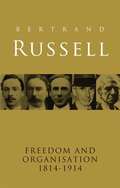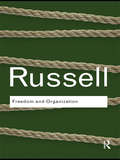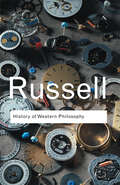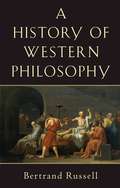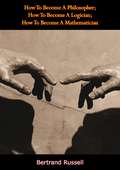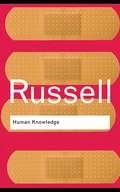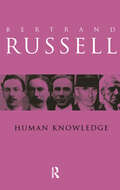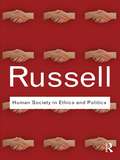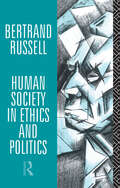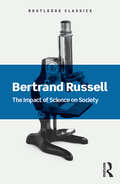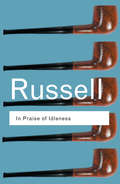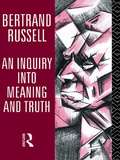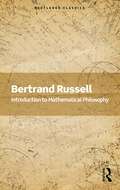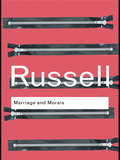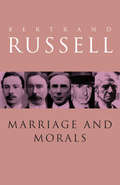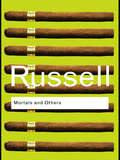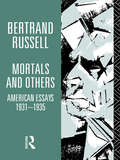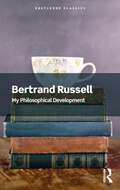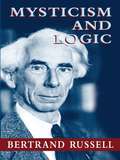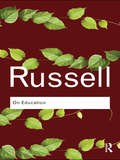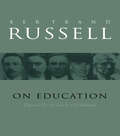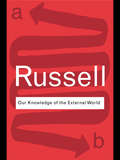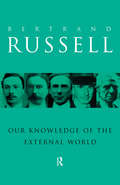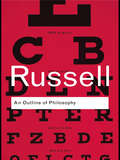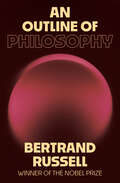- Table View
- List View
Freedom and Organisation, 1814-1914
by Bertrand RussellThe purpose of this book is to trace the opposition and interaction of two main causes of change in the Nineteenth century: the belief in freedom which was common to Liberals and Radicals, and the necessity for organization which arose through industrial and scientific technique.' - Bertrand Russell A revealing account by one of the twentieth century's greatest minds, charting the struggle between two determining forces in nineteenth century history: freedom and control. Russell's text sweeps from the defeat of Napoleon and the Congress of Vienna to the lead up to the First World War. It is full of lively portraits, including Malthus, Mill, Bentham and Marx. Russell examines the founding of democracy in America and the struggle with slavery, and brings to life the ideas of Jefferson, Jackson and Lincoln.
Freedom and Organization (Routledge Classics)
by Bertrand RussellWritten by one of the twentieth century’s most significant thinkers, Freedom and Organization, is considered to be Bertrand Russell’s major work on political history. It traces the main causes of political change during a period of one hundred years, which he argues were predominantly influenced by three major elements – economic technique, political theory and certain significant individuals. In the witty, approachable style that has made Bertrand Russell’s works so revered, he explores in detail the major forces and events that shaped the nineteenth century.
History of Western Philosophy: Collectors Edition (Routledge Classics)
by Bertrand RussellFirst published in 1946, History of Western Philosophy went on to become the best-selling philosophy book of the twentieth century. A dazzlingly ambitious project, it remains unchallenged to this day as the ultimate introduction to Western philosophy. Providing a sophisticated overview of the ideas that have perplexed people from time immemorial, it is 'long on wit, intelligence and curmudgeonly scepticism', as the New York Times noted, and it is this, coupled with the sheer brilliance of its scholarship, that has made Russell's History of Western Philosophy one of the most important philosophical works of all time.
History of Western Philosophy (Counterpoint Ser.)
by Bertrand RussellSince its first publication in 1945? Lord Russell's A History of Western Philosophy has been universally acclaimed as the outstanding one-volume work on the subject -- unparalleled in its comprehensiveness, its clarity, its erudition, its grace and wit. In seventy-six chapters he traces philosophy from the rise of Greek civilization to the emergence of logical analysis in the twentieth century. Among the philosophers considered are: Pythagoras, Heraclitus, Parmenides, Empedocles, Anaxagoras, the Atomists, Protagoras, Socrates, Plato, Aristotle, the Cynics, the Sceptics, the Epicureans, the Stoics, Plotinus, Ambrose, Jerome, Augustine, Benedict, Gregory the Great, John the Scot, Aquinas, Duns Scotus, William of Occam, Machiavelli, Erasmus, More, Bacon, Hobbes, Descartes, Spinoza, Leibniz, Locke, Berkeley, Hume, Rousseau, Kant, Hegel, Schopenhauer, Nietzsche, the Utilitarians, Marx, Bergson, James, Dewey, and lastly the philosophers with whom Lord Russell himself is most closely associated -- Cantor, Frege, and Whitehead, co-author with Russell of the monumental Principia Mathematica.
How To Become A Philosopher; How To Become A Logician; How To Become A Mathematician
by Bertrand RussellA brief yet informative book by one of the founders of analytic philosophy in which he introduces the reader to various analytic movements throughout the 20th century—Philosophy, Logicism, and Mathematics—and their application. A prolific writer on many subjects, and a great popularizer of philosophy, author Bertrand Russell is eminently placed to discuss these topics.An invaluable addition to any philosophy library!
Human Knowledge: Its Scope and Limits
by Bertrand RussellHow do we know what we "know"? How did we –as individuals and as a society – come to accept certain knowledge as fact? In Human Knowledge, Bertrand Russell questions the reliability of our assumptions on knowledge. This brilliant and controversial work investigates the relationship between ‘individual’ and ‘scientific’ knowledge. First published in 1948, this provocative work contributed significantly to an explosive intellectual discourse that continues to this day.
Human Knowledge: Its Scope and Value
by Bertrand RussellRussell's classic examination of the relation between individual experience and the general body of scientific knowledge. It is a rigorous examination of the problems of an empiricist epistemology.
Human Society in Ethics and Politics
by Bertrand RussellFirst published in 1954, Human Society in Ethics and Politics is Bertrand Russell’s last full account of his ethical and political positions relating to both politics and religion. Ethics, he argues, are necessary to man because of the conflict between intelligence and impulse – if one were without the other, there would be no place for ethics. Man’s impulses and desires are equally social and solitary. Politics and ethics are the means by which we as a society and as individuals become socially purposeful and moral codes inculcate our rules of action.
Human Society in Ethics and Politics (Routledge Classics Ser.)
by Bertrand RussellFirst published in 1992. Routledge is an imprint of Taylor & Francis, an informa company.
The Impact of Science on Society (Routledge Classics)
by Bertrand RussellMany of the revolutionary effects of science and technology are obvious enough. Bertrand Russell saw in the 1950s that there are also many negative aspects of scientific innovation. Insightful and controversial in equal measure, Russell argues that science offers the world greater well-being than it has ever known, on the condition that prosperity is dispersed; power is diffused by means of a single, world government; birth rates do not become too high; and war is abolished. Russell acknowledges that is a tall order, but remains essentially optimistic. He imagines mankind in a 'race between human skill as to means and human folly as to ends', but believes human society will ultimately choose the path of reason. This Routledge Classics edition includes a new Preface by Tim Sluckin.
In Praise of Idleness: And Other Essays
by Bertrand RussellIntolerance and bigotry lie at the heart of all human suffering. So claims Bertrand Russell at the outset of In Praise of Idleness, a collection of essays in which he espouses the virtues of cool reflection and free enquiry; a voice of calm in a world of maddening unreason. From a devastating critique of the ancestry of fascism to a vehement defence of 'useless' knowledge, with consideration given to everything from insect pests to the human soul, this is a tour de force that only Bertrand Russell could perform.
An Inquiry into Meaning and Truth
by Bertrand RussellBertrand Russell is concerned in this book with the foundations of knowledge. He approaches his subject through a discussion of language, the relationships of truth to experience and an investigation into how knowledge of the structure of language helps our understanding of the structure of the world. This edition includes a new introduction by Thomas Baldwin, Clare College, Cambridge
Introduction to Mathematical Philosophy (Routledge Classics)
by Bertrand Russell"The philosophy of mathematics will naturally be expected to deal with questions at the frontier of knowledge, as to which comparative certainty is not yet attained. But separation of such questions is hardly likely to be fruitful unless the more scientific parts of mathematics are known. A book dealing with those parts may, therefore, claim to be an introduction to mathematical philosophy..." - Bertrand Russell, from the Preface First published in 1919, Introduction to Mathematical Philosophy shows Russell drawing on his formidable knowledge of philosophy and mathematics to write a brilliant introduction to the subject. Russell explains that mathematics can be approached in two distinct directions: one that is driven by a mechanical kind of simplicity and builds towards complexity, from integers to fractions and real numbers to complex ones; and one that searches for abstractness and logical simplicity by asking what general principles underlie mathematics. From here Russell introduces and explains, in his customary pellucid prose, the definition of numbers, finitude, correlation and relation, mathematical limits, infinity, propositional descriptions and classes. Russell concludes with a fascinating summary of the relationship between mathematics and logic, of which he states "logic is the youth of mathematics." This Routledge Classics edition includes a new Foreword by Michael Potter.
Marriage and Morals (Routledge Classics Ser.)
by Bertrand RussellMarriage and Morals is a compelling cross-cultural examination of individual, familial and societal attitudes towards sex and marriage. By exploring the codes by which we live our sexual lives and conventional morality, Russell daringly sets out a new morality, shaped and influenced by dramatic changes in society such as the emancipation of women and the wide-spread use of contraceptives. From the origin of marriage to the influence of religion, Russell explores the changing role of marriage and codes of sexual ethics. The influence of this great work has turned it into a worthy classic.
Marriage and Morals: Marriage And Moral
by Bertrand RussellFirst published in 1985. Marriage and Morals won Bertrand Russell the Nobel Prize for Literature in 1950. With his customary wit and clarity, Russell explores the changing role of marriage, the codes of sexual ethics and the question of population. By what codes should we live our sexual lives? Every aspect, from the origin of marriage to the values of a healthy sex life, from the influence of religion, psychoanalysis and taboos to the possibilities of eugenics, receives the incisive scrutiny of Russell’s intellect. Here is the Passionate Sceptic at his most vigorous.
Mortals and Others: American Essays 1931-1935 (Routledge Classics Ser.)
by Bertrand RussellBetween 1931 and 1935, Bertrand Russell contributed some 156 essays to the literary pages of the American newspaper New York American. These were often fun, humorous observations on the very real issues of the day, such as the Depression, the rise of Nazism and Prohibition, to more perennial themes such as love, parenthood, education and friendship. Available for the first time in the Routledge Classics series in a single volume, this pithy, provocative and often-personal collection of essays brings together the very best of Russell’s many contributions to the New York American, and proves just as engaging for today’s readers as they were in the 1930s.
Mortals and Others, Volume I: American Essays 1931-1935
by Bertrand RussellThis collection of essays and journalism cover a wide range of topics, from balancing prosperity and public expenditure or the mental differences between boys and girls to 'who may use lipstick'. Mortal and Others shows the serious and non-serious side of Russell's personality and work. It provides a lively and revealing introduction to Russell's thought for all readers. First published in 1975, Mortals and Others is at last available in paperback with a new introduction by John Slater.
My Philosophical Development (Routledge Classics)
by Bertrand RussellMy Philosophical Development is Russell's intellectual autobiography and provides a fascinating insight into the extraordinary energy and philosophical ambition that saw him write over 40 books. As well as offering some fascinating glimpses into the changing nature of his philosophical beliefs, Russell also reflects on the fundamental themes that governed his thinking in later life. Beginning with an account of his decisive turn against the philosophical idealism that was prevalent in Cambridge at the turn of the century, Russell takes us through his engagement with the foundations of mathematics and the writing, with A.N. Whitehead, of Principia Mathematica. Russell also provides important insights into his theory of knowledge and the mind and conscious experience, before finishing with reflections on his work on language, universals and particulars and his theory of truth. An ideal philosophical companion to Russell's own Autobiography, My Philosophical Development is testament to one of the greatest minds of the 20th century. This Routledge Classics edition includes a new Foreword by Nicholas Griffin.
Mysticism and Logic
by Bertrand Russell10 brilliant essays by a Nobel Prize-winning philosopher challenge romantic mysticism and promote a scientific view of society and nature. Russell explains his theory of logical atomism in these witty, cogent writings, which include popular treatments of religious and educational issues as well as more technical examinations of problems of logic.
On Education
by Bertrand RussellBertrand Russell is considered to be one of the most significant educational innovators of his time. In this influential and controversial work, Russell calls for an education that would liberate the child from unthinking obedience to parental and religious authority. He argues that if the basis of all education is knowledge wielded by love then society can be transformed. One of Bertrand Russell’s most definitive works, the remarkable ideas and arguments in On Education are just as insightful and applicable today as they were on first publication in 1926.
Our Knowledge of the External World
by Bertrand RussellOur Knowledge of the External World is a compilation of lectures Bertrand Russell delivered in the US in which he questions the very relevance and legitimacy of philosophy. In it he investigates the relationship between ‘individual’ and ‘scientific’ knowledge and questions the means in which we have come to understand our physical world. This is an explosive and controversial work that illustrates instances where the claims of philosophers have been excessive, and examines why their achievements have not been greater.
Our Knowledge of the External World: As A Field For Scientific Method In Philosophy (classic Reprint)
by Bertrand Russell'Philosophy, from the earliest times, has made greater claims, and acheived fewer results than any other branch of learning ... I believe that the time has now arrived when this unsatisfactory state of affairs can be brought to an end' - Bertrand Russell So begins Our Knowledge of the Eternal World, Bertrand Russell's classic attempt to show by means of examples, the nature, capacity and limitations of the logico-analytical method in philosophy.
An Outline of Philosophy (Routledge Classics Ser.)
by Bertrand RussellIn his controversial book An Outline of Philosophy, first published in 1927, Bertrand Russell argues that humanity demands consideration solely as the instrument by which we acquire knowledge of the universe. From our inner-world to the outer-world, from our physical world to the universe, his argument separates modern scientific knowledge and our ‘seeming’ consciousness. These innovative perspectives on philosophy made a significant contribution to the discourse on the meaning, relevance and function of philosophy which continues to this day.
An Outline of Philosophy (Routledge Classics Series)
by Bertrand RussellIn his controversial book An Outline of Philosophy, first published in 1927, Bertrand Russell argues that humanity demands consideration solely as the instrument by which we acquire knowledge of the universe. From our inner-world to the outer-world, from our physical world to the universe, his argument separates modern scientific knowledge and our 'seeming' consciousness. These innovative perspectives on philosophy made a significant contribution to the discourse on the meaning, relevance and function of philosophy which continues to this day.
